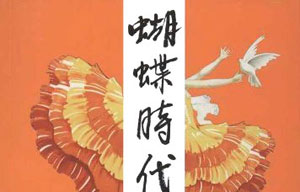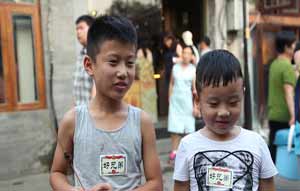To know the ethnic groups, read their prose
Updated: 2013-08-27 14:21
By Liu Jun (China Daily)
|
||||||||
 |
|
Ou Ning, editor-in-chief of Chutzpah! |
Aydos Amantay, a young Kazak writer who grew up in Beijing, pulls the reader's heartstrings with his passionate confession about the loss of his cultural roots.
In his novella titled Loser, a university dropout returns to his hometown in Xinjiang Uygur autonomous region as a temporary volunteer teacher. The students offer him buttered naan bread dipped in milk tea, then they sing folk songs, holding hands in a tight circle.
Still, the teacher finds it hard to get back to his cultural roots, just as it is hard for him to pick up Kazak, or for his students to learn Mandarin.
But when an outsider sneers at them, the teacher finally stands up for his people.
Distinctive characters like these draw readers like a magnet to the 14th issue of the Chinese-English literary journal Chutzpah!
"Chutzpah" is a Yiddish word for audacious behavior. With the Chinese name Tian Nan, the bimonthly funded by Modern Media Group in April 2011 features original fiction, poetry and essays with sample translations in the section Peregrine.
The June issue presents 12 authors seeking their cultural roots including Amantay and Uygur author Alat Asem. Except for Shanghai-based Ren Xiaowen, whose novella Balcony is translated by Eleanor Goodman, all the others come from ethnic groups, telling stories from folklore, childhood and present life.
| Niche literary leader |

 Victoria Beckham S/S 2014 presented during NYFW
Victoria Beckham S/S 2014 presented during NYFW
 'Despicable' minions upset Depp's 'Lone Ranger' at box office
'Despicable' minions upset Depp's 'Lone Ranger' at box office
 'Taken 2' grabs movie box office crown
'Taken 2' grabs movie box office crown
 Rihanna's 'Diamonds' tops UK pop chart
Rihanna's 'Diamonds' tops UK pop chart
 Fans get look at vintage Rolling Stones
Fans get look at vintage Rolling Stones
 Celebrities attend Power of Women event
Celebrities attend Power of Women event
 Ang Lee breaks 'every rule' to make unlikely new Life of Pi film
Ang Lee breaks 'every rule' to make unlikely new Life of Pi film
 Rihanna almost thrown out of nightclub
Rihanna almost thrown out of nightclub
Most Viewed
Editor's Picks

|

|

|

|

|

|
Today's Top News
Going green can make good money sense
Senate leader 'confident' fiscal crisis can be averted
China's Sept CPI rose 3.1%
No new findings over Arafat's death: official
Detained US citizen dies in Egypt
Investment week kicks off in Dallas
Chinese firm joins UK airport enterprise
Trending news across China
US Weekly

|

|









